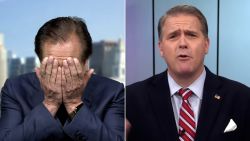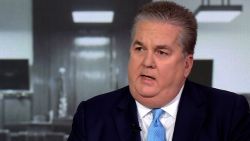There might be people of color at the Republican National Convention. But that doesn’t mean that the event is really about them or their experiences.
This disconnect is apparent even in the way President Donald Trump has said almost nothing about the recent police shooting of Jacob Blake, a 29-year-old Black man, in Kenosha, Wisconsin, but has urged the National Guard to end the protests there “FAST.”
Vice President Mike Pence in his acceptance speech on Wednesday ignored the widespread protests against police violence by athletes in the NBA, WNBA and MLB to instead make the case for standing for the flag no matter what. And he turned the Kenosha protests into an opportunity not to look at what’s happening to Black Americans but to attack Democratic nominee Joe Biden.
“Last week, Joe Biden didn’t say one word about the violence and chaos engulfing cities across this country,” Pence said. “The violence must stop – whether in Minneapolis, Portland, or Kenosha. Too many heroes have died defending our freedoms to see Americans strike each other down. We will have law and order on the streets of America for every American for every race and creed and color.”
Yet on the first two nights of the convention, Republicans gave a big platform to a diverse lineup of speakers, including former South Carolina Gov. Nikki Haley and Sen. Tim Scott, also of South Carolina, who spoke of a more inclusive future.
On Tuesday, Navajo Nation Vice President Myron Lizer credited Trump with including $8 billion – “the largest financial funding package ever to Indian Country” – in the CARES Act.
Trump pardoned Jon Ponder, a convicted felon and the CEO of Hope for Prisoners, Inc., who in a video thanked the President for going “out of his way” to support former prisoners who are rejoining society.
Kentucky Attorney General Daniel Cameron aimed his arrows at Biden’s recent controversial remarks (subsequently walked back) that painted Black Americans as a monolithic community.
“Mr. Vice President, look at me. I am Black,” Cameron said on Tuesday. “We are not all the same, sir. I am not in chains. My mind is my own, and you can’t tell me how to vote because of the color of my skin.”
And in a video that muddied the lines between official White House business and Trump’s political aspirations, the President oversaw a naturalization ceremony featuring a diverse group of candidates.
Read more from Brandon Tensley:
Yet all this attention seemed less about engaging people of color than humanizing Trump and soothing his largely White supporters, who might want to back him without feeling like they’re abetting bigotry.
Consider the wider setting of the convention. Despite Lizer’s praise of Trump, tribal leaders have said that payments have been delayed and that the Trump administration initially opposed and low-balled the stimulus funding.
Trump won only 8% of votes cast by Black Americans in 2016. His standing among this demographic (in particular) remains low.
Meanwhile, the President has been criticized for his handling of the Black Lives Matter protests that have occurred across the country since Minneapolis police killed George Floyd in May.
Just last month, Trump called Black Lives Matter a “symbol of hate” – a striking choice of words, considering how dramatically public opinion on the movement has shifted.
And as my CNN colleagues Priscilla Alvarez and Catherine E. Shoichet explained in July, this summer has seen an unprecedented throttling of legal immigration to America, thanks to the current administration.
The second night of the convention illustrated that there’s a difference between being a prop for political theater and having power, and that Trump is determined for this power to remain his.
This story has been updated with reporting from Pence’s convention speech.





















